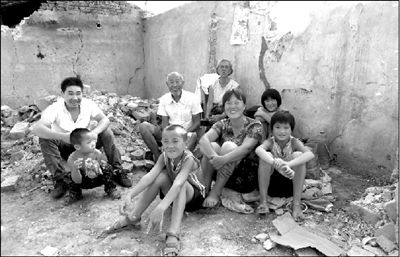More must be done for SNWD relocatees
- By Lu Na
 0 Comment(s)
0 Comment(s) Print
Print E-mail
, November 21, 2011
E-mail
, November 21, 2011
The Beautiful Danjiang River is the water resource of the South-to-North Water Diversion Project (SNWD). The Danjiang Reservoir will be enlarged from its current 162 meters to 176.6 meters and, as a result, some 162,000 people in Xichuan County will have to leave their homes and relocate.
By Aug 25, 1,192 citizens in Zhangzhuang village of Taohe Town, Xichuan County, Henan Province had moved out of their homes, and the relocation of citizens from the reservoir area had almost been completed.
|
|
|
Family members take a photo in front of their demolished house in Zhangzhuang Village, Taohe Town, Xichuan County on Aug 24. [File photo] |
Xichuan County is the only county in Henan Province which requires people to relocate, and many relocation slogans have been written on the roads.
Zhao Chuan, a reporter of the Henan Daily newspaper, has interviewed people being relocated from 140 villages of 11 towns of Xichuan County since Aug 2009. She asked many people: "Do you know why you have to move?"
The main response was: "Because Beijing is thirsty". Many also commented that the expansion of the reservoir is a tremendous project and, even though they don't want to leave, they are prepared to make sacrifices for China.
Among those relocating, the oldest is 102 years old and the youngest only 24 hours.
An 82-year old lady who lived in Shengwan Town of Xichuan County, worshiped at the tombs of her husband and ancestors before leaving. She murmured: "I can't come [to the tombs] anymore because it is going to be changed into water ..." The woman was so overcome with grief that she sank to the ground, unable to complete her sentence.
Some citizens took branches and leaves from fruit trees, some took a bottle of Danjiang River water and some older citizens even brought coffins with them.
Xu Hu, the secretary of the Party Committee of Jiuchong Town, is the former secretary of the Party Committee of Xianghua Town. He said that Xianghua Town boasts the largest pepper market in China and one-third of Xianghua Town's residents are engaged in the pepper trade. Liulou village is the richest village in Xianghua Town. In total, there are over 80 cars in the village, some costing more than RMB 200,000. It's easy to see why no one wanted to move.
People's reluctance was compounded by the fact that the proposed relocation site, Peiying Town in Dengzhou City, has poor soil quality and equally poor transportation links.
To help villagers overcome their reluctance, Xu persuaded them to go and see Peiying Town for themselves so that they could make an informed decision. Finally, having seen the place, the villagers agreed to leave. Xu appreciated their positive attitude.
However, the relocation has not been problem-free. Due to the poor condition of some of the houses and tensions with local people, many of those who relocated have moved out of their new homes, with some even choosing to live wild in the mountains.
Wu Jiabao, Disciplinary and Supervisory Group Leader of Nanyang City Bureau of Immigration said that relocatees who had to move to Qinghai only brought enough food to last one week and only one military coat to protect against the cold. As a result, due to the harsh environment, climate and military-style administration they faced there, many relocates fled from Qinghai.
"They beg along the railway line and some starve to death," Wu said.
Relocatees who moved to Jinmen County and Zhongxiang County of Hubei province between 1966 and 1968 faced similar problems. The stresses and strains of everyday life led to conflict with local people and, as a result, many relocatees fled from their new homes.
Many people resided on the banks of the Danjiang River. "Yanjiang Village was a new village consisting of crowded relocatees," Wu said. "Xichuan County didn't solve their Hukou (registered permanent residence) until the 1970s."
Since 2003, the government has banned the building of new houses in the reservoir area. Because of this, relocatees have to live in old, dilapidated houses while they wait to move.
Wu said the relocation arrangement work is very important, and that it usually takes relocatees around 3 months to fully adapt to their new situation: "Those who fail to adapt tend to leave, and this hasn't happened so far."
Officials in Nanyang City Immigration Bureau and Xizhou County Immigration Bureau have mentioned the possibility of building a relocation museum, and a plan to do so is currently under consideration.
Approval of the plan will result in a lasting and meaningful memorial for the relocatees of Xichuan County.







Go to Forum >>0 Comment(s)